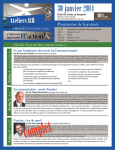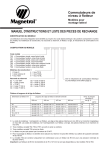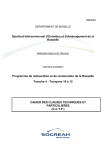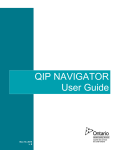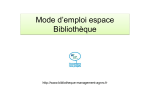Download Welcome Bienvenu - Centre d`accès aux soins communautaires
Transcript
199 County Court Blvd. Brampton,ON L6W 4P3 199, boul. County Court Brampton,ON L6W 4P3 Welcome Bienvenu 199 County Court Blvd. Brampton, ON L6W 4P3 199, boul. County Court Brampton, ON L6W 4P3 Tel/Tél: 905 796 0040 888 733 1177 www.cw.ccac-ont.ca OUR SERVICES • Care Coordination • Information and Referral • Long-Term Care Placement • Nursing • Nutritional Counselling/ Dietetics • Occupational Therapy • Physiotherapy • Personal Care and Home Support • Services for Children and Youth incl. Mental Health and Addictions • Social Work • Speech-Language Pathology • Many other community-based health services WHO WE ARE • A one-stop access point to community-based health care services; • Part of a province-wide community care network, able to coordinate services for people wherever they live in Ontario; • Funded by the Ministry of Health and Long-Term Care. Access us 7 days a week, 365 days a year Visit us online at www.cw.ccac-ont.ca Telephone: 905-796-0040 Toll Free: 1 888 733 1177 Central West Centre-Ouest Fact Sheet WHAT WE DO Each patient is assigned a Care Coordinator, a skilled health care professional who will conduct an assessment of your health care needs and determine what home care services you require. They: • • • • • • Help people navigate through a complex health care system; Connect people to appropriate and available health care services in their own community; Help patients maintain independence in their own homes with dignity; Arrange in-home health care services; Arrange in-school student support services; Support patients through the application and admission process to a long-term care home when living at home is no longer possible. COMMUNITY CARE ACCESS CENTRES ARE FOR EVERYONE • Anyone can call to out about services • Services are for people of any age • CCAC services are provided at no cost to patients. COMMUNITY CARE ACCESS CENTRE CARE COORDINATORS • Are patient focused; • Are sensitive to diversity and culture; • Visit patients in home, hospital or school; • Evaluate each patient’s individual needs; • Determine your eligibility for admission, provide support through the application process, and prioritize and manage your admission process to a long-term care home when living at home is no longer possible; • Coordinate services that ensure the most appropriate levels of care, rehabilitation and independence. Community Care Access Centres also provide a single point of access for information and referral to community resources. We can provide you with information on communitybased care, or refer you to other agencies* to meet your unique needs, such as: • Transportation assistance • Meal delivery and dining programs • Adult Day Programs • Caregiver support groups ... and more. * A fee may be charged for services provided by community agencies 199 County Court Blvd. Brampton, ON L6W 4P3 199, boul. County Court Brampton, ON L6W 4P3 Tel/Tél: 905 796 0040 888 733 1177 www.cw.ccac-ont.ca Fiche de renseignements NOS SERVICES • Conseils en nutrition et diététique • Ergothérapie • Gestion de cas et coordination des soins • Information et renvoi • Nombreux autres services de santé communautaires • Orthophonie • Physiothérapie • Placement dans une maison de soins de longue durée • Services aux enfants et aux jeunes, compris la santé mentale et dépendance. • Soins • Soins personnels et soutien à domicile • Pathologie de Discours-langue QUI NOUS SOMMES • Un point d’accès unique aux services de santé communautaires; • Membre d’un réseau provincial de soins communautaires en mesure de coordonner les services destinés à tous les Ontariens; • Financés par le ministère de la Santé et des Soins de longue durée Vous pouvez nous joindre 7 jours par semaine, 365 jours par année. Visitez le site Web du CASC du Centre-Ouest www.cw.ccac-ont.ca Téléphone: 905-796-0040 Sans frais: 1-888-733-1177 Central West Centre-Ouest CE QUE NOUS FAISONS Chaque client est jumelé à un coordination de soin, soit un professionel de la santé compétent qui évaluera vos besoins en matière de santé et déterminera les services de soins à domicile dont vous avez besoin. • Guidons les gens dans un système de soins de santé complexe; • Dirigeons les gens vers les services de soins de santé appropriés et offerts dans leur communauté; • Aidons nos patients à conserver leur autonomie dans leur propre domicile, dans la dignité; • Organisons les services de soins de santé à domicile; • Organisons les services de soutien aux élèves à l’école; • Aidons nos patients au cours du processus d’inscription et d’admission nécessaire au placement dans une maison de soins de longue durée lorsqu’il leur devient impossible de demeurer dans leur domicile. LES CENTRES D’ACCèS AUX SOINS COMMUNAUTAIRES S’ADRESSENT À TOUS • N’importe qui peut appeler pour se rensigner sur nos services. • Nos services s’adressent aux personnes de tout âge. • Nos services sont offerts gratuitement. LES COORDONNATEURS DE SOINS DES CENTRES D’ACCèS AUX SOINS COMMUNAUTAIRES • ont une démarche axée sur le patient; • tiennent compte de la diversité et des différentes cultures; • rendent visit aux patient à domicile, à l’hôpital ou à l’école; • évaluent les besoins de chaque client; • déterminent votre admissibilité, fournissent du soutien pendent le processus de demand, établissent la priorité de votre admission dan une maison de soins de longue durée lorsqu’il vous devient impossible de demeurer dans votre domicile; • coordonnent les services qui assurent des niveaux de services, de réadaptation et d’autonomie appropriés. Les centre d’accès aux soins communautaires fournissent également un point d’accès unique à des renseignements sur les ressources communautaires et des renvois à celles-ci. Nous pouvons vous offrir de l’information sur les soins communautaires ou vous orienter vers d’autres organismes* pour combler vos besoins uniques, tels que: • aide au transport • livraison de repas et programmes de repas • programmes de soutien pour les soignants • nombreux autres services* * Des frais pourraient être exigés PATIENT ’S RIGHTS AND RESPONSIBILITIES FOR MEDICAL EQUIPMENT The Central West CCAC may approve the loan of Medical Equipment for a short me to help you with your care. If you need equipment on an ongoing basis, it is your responsibility to rent or buy the equipment. Your Care Coordinator will work with you to help make these arrangements, if needed. Please read all the informaon below on your Rights and Responsibilies. The Central West CCAC can be contacted at Ph: 905-796-0040 or Toll Free: 1-888-733-1177 PATIENT’S RIGHTS You have the right to: • Parcipate in the development of the • • • • • • goals related to your need for medical equipment. Receive informaon about CCAC policies and guidelines for medical equipment including: o Criteria for ending the loan of Medical Equipment o Case Management and service providers role in assisng you with acquiring the equipment you need Receive medical equipment that has been cleaned by the supplier and arrives in good working order. Receive instrucons from the supplier on how to use and safely store the equipment. Receive informaon on who to contact if you have any quesons or concerns about the equipment. Receive informaon about funding sources for acquiring equipment that is needed on a long term basis. Choose your own supplier when you rent or purchase equipment. PATIENT’S RESPONSIBILITIES You are responsible for: • Informing the CCAC immediately when the • • • • • • • • • equipment is no longer required. Informing the CCAC/Supplier immediately when the equipment does not arrive in sasfactory condion, i.e. soiled, does not work or needs repairs and following the instrucons regarding the ongoing use of the equipment unl it is repaired or replaced. Using the equipment only as intended. Not losing or damaging the equipment by inappropriate use or not using the equipment as instructed. NOTE: THE SUPPLIER MAY SEEK COMPENSATION IN THESE CIRCUMSTANCES. Not un-installing or removing the equipment installed by the supplier. Informing the CCAC, in advance of any plans to move the equipment to any other place within the home or to another treatment site. Returning equipment if you do not plan to rent or purchase it. Making arrangements to rent or buy the equipment aer the CCAC equipment rental period ends. Arranging to take over the cost of rental/purchase of equipment not returned to the supplier aer the CCAC equipment rental period ends. Making the equipment available for pickup at a prearranged me as soon as possible aer the CCAC has disconnued the rental. DROITS ET RESPONSABILITÉS DU PATIENT À L’ÉGARD DU MATÉRIEL MÉDICAL Le CASC du Centre-Ouest peut approuver le prêt à court terme de matériel médical pour faciliter vos soins. Si vous avez besoin de matériel en permanence, vous devez le louer ou l’acheter. Votre coordonnateur de soin travaillera avec vous pour vous aider, au besoin, à prendre les arrangements nécessaires. Veuillez lire vos droits et responsabilités, énoncés cidessous. Pour joindre le CASC du Centre-Ouest, composer le 905 796-0040 ou, sans frais, le 1 888 733-1177. DROITS DU PATIENT Vous avez le droit de : • Parciper à l’établissement des objecfs • • • • • • liés à votre besoin de matériel médical. Recevoir de l’informaon sur les poliques et les direcves du CASC au sujet du matériel médical, notamment : o les critères d’annulaon du prêt de matériel médical; o le rôle des gesonnaires de cas et des fournisseurs de services en mesure de vous aider à faire l’acquision du matériel dont vous avez besoin. Recevoir un matériel médical neoyé par le fournisseur, fonconnel et en bon état. Recevoir du fournisseur le mode d’emploi et d’entreposage sécuritaire du matériel. Recevoir les coordonnées de la personne à joindre si vous avez des quesons ou des préoccupaons au sujet du matériel. Recevoir de l’informaon sur les sources de financement pour l’acquision du matériel dont vous avez besoin à long terme. Choisir vous-même le fournisseur à qui vous louez ou achetez du matériel. RESPONSABILITÉS DU PATIENT Vous avez l’obligaon de : • Prévenir le CASC immédiatement lorsque vous • • • • • • • • • n’avez plus besoin du matériel. Prévenir le CASC ou le fournisseur immédiatement lorsque le matériel reçu n’est pas en bon état, c.-à-d. s’il est souillé, ne fonconne pas ou a besoin d’une réparaon, et suivre les instrucons concernant l’usage connu du matériel jusqu’à ce qu’il soit réparé ou remplacé. Uliser le matériel uniquement aux fins prévues. Veiller à ne pas perdre le matériel et à ne pas l’endommager par un usage inapproprié ou contraire aux instrucons données. NOTA : LE FOURNISSEUR PEUT DEMANDER UNE INDEMNISATION EN PAREILLES CIRCONSTANCES. Veiller à ne pas démonter ou enlever le matériel installé par le fournisseur. Informer le CASC à l’avance si vous comptez installer le matériel à un autre endroit dans la maison ou dans un autre centre de traitement. Retourner le matériel si vous n’avez pas l’intenon de le louer ou de l’acheter. Prendre des arrangements pour la locaon ou l’achat du matériel à la fin de la période de locaon prévue par le CASC. Prévoir la prise en charge du coût de locaon ou d’achat du matériel qui n’est pas retourné au fournisseur à la fin de la période de locaon prévue par le CASC. Préparer le matériel pour sa cueillee à un moment convenu au préalable, dès que possible à la fin de la période de locaon prévue par le CASC. Your Current CCAC Service Plan 199 County Court Blvd. Brampton, ON L6W 4P3 199, boul. County Court Brampton, ON L6W 4P3 Type of Service Agency Your Care Coordinator is: __________________________________ Care Coordinator Extension:______ Care Team Extension:____________ Telephone No: 1 888 733 1177 or 905 796 0040 Agency Tel. Comments Important Information Regarding Your Service Plan In the case of a health Call your CCAC Care 1. care emergency, 2. Coordinator when: call 911 or go to the • you require any emergency department assistance of your local hospital. • you have questions about the services you are receiving • you are admitted to hospital 3. Call your Service Provider Agency (e.g. your nurse, therapist, personal support worker) when: • you need to change a scheduled appointment • the Service Provider doesn’t arrive for a scheduled appointment • you have questions about service Long-Term Care ACTION Line Offers Services for CCAC Patient Complaints The Long-Term Care ACTION Line was established in January 2004 for residents of long-term care homes to report any concerns they had about care and the services provided by their long-term care home. The Long-Term Care ACTION Line has now been expanded so that home care patient, or others, like family members, can call with any concerns or complaints they might have about home care services and/or their CCAC. The Independent Complaint Facilitator will: • Listen to CCAC patient concerns or complaints about CCAC services • Work with patients to address their complaints • Mediate disputes between patients and their CCAC and/or service provider agency/staff • Assist CCAC staff in identifying and developing innovative approaches to support patients The Long-Term Care ACTION Line will facilitate the referral of CCAC patient complaints to an independent third party called an Independent Complaint Facilitator when requested by the CCAC client. 1-866-876-7658 or 416-326-6777 (outside Ontario) All communications between the CCAC patient and the facilitator are strictly Facilitators are only permitted to share information with the consent of the CCAC patient - and then only with those persons directly involved with addressing the complaint (e.g. the CCAC and/or service provider staff). With the consent of the patient, the facilitator may also share information with family members or other caregivers. For these reasons, CCAC patients may wish to follow the formal CCAC complaints process. CCAC patients who work with facilitators retain all their legal rights to use the formal CCAC complaints process at any time. Where there is a between the facilitator process and the formal CCAC complaints process, the formal process will prevail. CCACs also have a complaints process. While patients are encouraged to work directly with their CCAC and/or service provider, some may be reluctant to do so. The Action Line offers these individuals an additional option to address their concerns. If the CCAC patient is not satisfied with the decision of the Patient Complaint Review process of the Central West CCAC, and the Long-Term Care ACTION Line, the patient may appeal the decison to the Health Services Appeal Board of the Ministry of Health. This is in accordance with Bill 173, Section 40 to 49. Facilitators work independently from the CCACs and do not have the authority to make decisions on, or recommend: Formal Appeal Health Services Appeal & Review Board • CCAC services Attn: Registrar, Health Boards Secretary • Increases in service levels authorized by CCACs 151 Bloor Street West, 9th Floor • The provision of alternative services not provided by CCACs, or Tel: 416-327-8512 or 1-866-282-2179 • Changes in CCAC policies or procedures Email: [email protected] Toronto, Ontario M5S 2T5 Fax: 416-327-8524 To access the Long-Term ACTION Line, please call: 1-866-876-7658 or 416-326-6777 (outside of Ontario) For TTY services, call: 1-800-387-5559 or 416-327-4282 (outside of Ontario) Individuals can also visit the Ministry of Health and Long-Term Care website at: www.health.gov.on.ca 4. Tell your health care team if you have ever had a reaction to any medicine or food. If you get sick, your health care team may need to act fast. Before they give you any medicine, they will need to know if you could have a bad reaction to it. That’s why you should tell them in advance about any allergy or reaction you have ever had to medicine or food. Reactions can include rashes, headaches, breathing trouble, and feeling sick. Because some medicines have food in them (such as the eggs used in the flu shot), be sure to talk about your food allergies too. Tell a member of your team right away if a new medicine makes you feel unwell. If you do not know of any allergies, you can get tested. Don’t wait until you get sick to tell people about your allergies. Some people wear an ID bracelet such as MedicAlert™. This tells the health care team about your allergies when you can’t tell them yourself. 5. Make sure you know what to do when you are at home. When you are getting ready to come home from the hospital or after a health care appointment, ask as many questions as you can. Make sure you understand what you need to do when you are at home. Write this information down or have a family member or friend write it for you. Share the information with your other health care providers. Home and Community Sector Your Health Care Be Involved Here are some good questions to ask: • What support should I have at home? • Are there safety concerns I should be aware of? (For instance, rugs that might be a falling hazard or poor lighting) • Will I have trouble moving around? • When can I return to work? • What medications do I need to take when I am at home? This brochure has been prepared for general information and as a reference guide, and is not intended to be and is not a comprehensive or definitive statement or review regarding the subject matter contained herein. This brochure is not intended to provide any legal or medical advice. You should not adapt or change any medical treatments or practices without consulting with your doctor. This brochure may not be modified, adapted, published or sold in whole or in part without the prior written permission of, and with express attribution to, OHA. Downloading, distribution, reproduction, and display for non-commercial personal use are permitted without prior written permission. © Ontario Hospital Association, 2009. All rights reserved. Funding for this project was initially provided by the Ontario Ministry of Health and Long-Term Care. www.ccac-ont.ca/ClientSafety 1. Be involved in your health care. Speak up if you have questions about your care. Be an active member of your health care team. A member of your health care team is anyone who is assisting you with your care inside or outside of your home. Take part in every decision about your care. Ask questions so you can make informed choices. Come prepared for your health care appointment. Know what to do when you go home. If you don’t feel your concerns are being heard, ask again. What you should know You should understand as much as you can about: • your health problem or your diagnosis • the care you will need • medicine you should take and how to take it Here are some good ways to ask questions: • What is my care plan? • What should I tell my family or caregiver? • Can you tell me more about my health problem? • Are there any other options? • What can I do at home to help my progress? 2. Tell your health care team about your past illnesses and your current health condition. You know the most about your health. Tell your health care team everything you can, even if you think they already know. Tell them even if you think it is not important. Tell them if: • • • • • • • • • • • you are not feeling well right now you have been sick or have fallen lately you are taking any medicine you have had surgery or recent visits to the hospital you have seen another doctor or received other health care services you have a chronic illness like diabetes or heart disease you have a family history of an illness, such as high blood pressure, asthma, or cancer you have a history of tobacco, drug, or alcohol use you have been feeling tired or doing less lately you are not eating well or not feeling hungry you or a family member, have a disease that can spread to others 3. Have all of your medicines with you at every health care appointment. Some medicines combine with each other in your body and produce bad reactions. To protect you, your health care team must know about any prescription drugs you take. They must also know about other medicines you buy, such as: • vitamins • herbs and herbal remedies • food supplements • “over the counter” medicine you buy at the drugstore Always keep your medicine in the bottle or packaging it came in. If you cannot bring all your medicines with you, keep a list of everything you take. Keep this list up to date. Bring it with you when you go to the hospital or to a health care appointment. Your doctor and pharmacist can help you make the list. Fire Safety – What You Can Do? Local Department Contacts: • Test smoke and carbon monoxide alarms monthly • Change alarm batteries every time you change your clocks for Daylight Savings Time • Have fire extinguishers and know how to operate them • Do not leave cooking unattended or leave the stove on • Be cautious when using greasy pots for deep frying Brampton (905) 874-2700 • Check power cords to make sure they are not frayed, cracked or damaged Mississauga (905) 615-3777 • Keep space heaters at a safe distance from combustible materials and unplug when not in use Etobicoke (416) 338-9450 • For smokers, use large deep ashtrays and wet down the ashes and cigarette butt before disposing of them • Never leave burning candles unattended • Have a fire exit plan and practice it • Call your local fire services for a free Home Fire Safety Inspection *In case of fire, always call 9-1-1* Caledon (905) 584-2241 Orangeville (519) 941-3083 Woodbridge (905) 832-8531 Central West Community Care Access Centre Quick Tips and Important Information Home Visit Safety and You The Central West Community Care Access Centre is dedicated to ensuring your safety and security, whether we are visiting you at your home or arranging services for you with our service providers. You can feel confident that we have your personal security in mind. For your safety: Whenever a Central West CCAC care coordinator or one of our contracted service providers visits you in your home, we will always: • Pre-arrange our visit times, often calling shortly before our arrival • Carry identification that includes our name and photograph For your security: Your knowledge and consent are required for the collection, use and sharing of your personal health information. We will explain to you why we are collecting this information, and we will ask for your consent to use the information. We will never ask for your bank account number, credit card number or bank card number. Protect yourself and your home: • Always inspect the photo identification of any stranger who comes to your door. • Keep valuables such as your credit cards, bank cards and cash safely stored in your home. • Never give out your account numbers or bank card numbers. • If you suspect someone is not who they say they are, do not let them into your home. • To confirm it is a home care worker at your door, you can call us at 1 888 733 1177. • If you think someone has stolen from you, contact your local police department immediately. Votre rôle dans la sécurité des visites à domicile Le CASC du Centre-Ouest s’engage à assurer votre sécurité et votre protection, que nous vous visitions à domicile ou que nous prenions les dispositions nécessaires à la prestation de services par nos fournisseurs. Soyez assuré que votre sécurité personelle nous tient à coeur. Pour votre sécurité Chaque fois qu’un gestionnaire de cas du CASC du Centre-Ouest ou qu’un de nos founisseurs de services à contrat vous visitera à domicile, nous: • établiron l’heure des visites à l’avance et, souvent, nous appelleron peu avant notre arrivée; • présenterons une pièce d’identité munie d’une photo Pour votre protection Vous devez être au courant de la collecte, de l’utilisation et du partage des renseignments personnels sure votre santé et y consentir. Nous vous expliquerons pourquoi nous recueillons cette information et vous demanderons votre consentement pour l’utiliser. Nous ne vous demanderons jamais vos numéros de compte de banque, de carte de crédit ou de carte bancaire. Protégez-vous et protégez votre maison • Regardez toujours la carte d’identité à photo de tout étranger qui se présente à votre porte. • Gardez vos objets de valeur comme vos carte de crédit, vos cartes bancaires et votre argent comptant dans un endroit sûr de la maison. • Ne donnez jamais vos numéros de comptes ou de carte bancaires. • Si vous croyez que la personne à votre porte est bien un employé des soins à domicile, vous pouvez nous appeler au 1 888 733 1177. • Si vous croyez avoir été volé, communiquez avec l’escouade des fraudes de votre service de police local pour signaler immédiatement le crime. How To Prevent Falls • Have good lighting in each room • Ensure floor surfaces are slip-resistant and mats/carpets have a slip-resistant backing • Have ‘grab bars’ or rails (e.g. in bathroom and stairways) • Keep items you use often in easy-to-reach places • Keep floors dry and clutter-free • Wear appropriate footwear (e.g. slip-resistant soles, low heels, etc.) and avoid wearing just socks on tile or wood floors • Securely fasten railings on both sides of all stairways • Keep all walkways, ramps and stairs free of wet leaves, snow and clutter • Use caution when getting in and out of the car What To Do If You Fall Try not to panic. Rest for a moment. If you can, get up. If You Are Injured: DO NOT try to get up Get Help: Attempt to reach a phone. Call 911 and stay on the line. Keep Warm: Use anything that is nearby:bedding, a coat, even a tablecloth. If You Are Wet: If your bladder “lets go” in the fall, move away from the damp area to keep warm. Move Your Limbs: Gently moving your arms and legs will help your circulation and reduce pressure areas. Be aware of signs and symptoms of cold illnesses. Follow first aid procedures promptly as outlined below: Frostnip: Mild form of frostbite where only the skin freezes. Skin appears yellowish or white, but feels soft to the touch and painful tingling or burning sensation may be experienced. Treatment: Get out of the cold. Warm the affected area slowly with body heat. Try blowing warm breath onto the affected area or tucking your hands into your armpits. Once the affected area is warm, do not re-expose it to the cold. Never rub or massage the area where there is cold injury. Frostbite: A more severe condition where both the skin and the underlying tissue (e.g. fat, muscle, bone) are frozen. Symptoms include swelling and redness in the early stages, tingling and burning sensation in the extremities and numbness. Skin becomes white and waxy/greyish yellow and is hard to the touch. Treatment: Get medical help; frostbite can be a serious medical emergency. If possible, move the victim to a warm area. Gently loosen or remove tight clothing or jewelry that may restrict circulation. Warm the affected area slowly as for frostnip. CAUTION: If there is a possibility that the affected area might be refrozen before medical help arrives, do not warm. This greatly increases the risk of tissue damage. DO NOT allow the victim to drink alcohol or smoke. Hypothermia: Feeling cold over a prolonged period of time can cause a drop in body temperature. Symptoms include drowsiness, shivering, irritability, confusion, stiff muscles, slurred speech, fatigue, discoloration of lips, cold skin and apathy. This can progress to a life-threatening condition where shivering stops, the person loses consciousness and cardiac arrest may occur. Treatment: Get medical help immediately. Move the person indoors and remove any wet clothing. Place the victim between blankets so the body temperature can rise gradually. Body-to-body contact can help warm the person’s temperature slowly. DO NOT use hot water bottles or electric blankets. If the person appears unconscious, call 9-1-1 and start CPR if necessary. How to Stay Safe in the Cold • Stay active, maintain good nutrition and get plenty of rest • Drink warm fluids to prevent dehydration • Postpone outdoor activities or reduce the amount of time spent outdoors when the temperature is -25° Celsius or colder (with or without the wind chill) • Maintain a heated indoor environment in the home or office (landlords MUST maintain the heat at a minimum of 20° Celsius between September 15th and June 1st) • Do not use an oven as a heating device. Ensure space heaters are well maintained and used properly to avoid fire risk • Remember to dress in layers of warm clothing • Change wet clothing or footwear immediately Be aware of the signs and symptoms of heat illnesses. Follow first aid procedures promptly as outlined below: Sunburn: Symptoms include redness, pain, swelling of skin, blisters, fever and headaches. Treatment: Leave water blisters intact to speed healing and avoid infection. If breaking of blister occurs, apply sterile dressing. Serious cases should be seen by a physician. Heat Cramps: Symptoms include heavy sweating can cause painful muscle spasms, usually in the legs but possibly in the abdomen. Treatment: Apply firm pressure on cramping muscles or gently massage to relieve spasm; give sips of water. If nausea occurs, discontinue sips of water and move person to a cooler place to rest in a comfortable position. Observe carefully for changes in condition. Heat Exhaustion: Symptoms include heavy sweating, weakness, cold, pale and clammy skin, weak pulse, fainting and vomiting. Treatment: Move person out of the sun to a cooler environment. Lay person down and loosen clothing, apply cool wet cloths and give sips of water. If nausea occurs, discontinue sips of water; if vomiting continues, seek immediate medical attention. How to Stay Safe in the Heat • When in the sun, cover up and stay in the shade • Wear loose-fitting long shirts and pants, a wide-brimmed hat and UV-protective sunglasses • If your home does not have air conditioning, go to the shopping mall, library, recreational facilities or heat-relief shelters • Stay well hydrated. Plain water is the liquid of choice; diluted fruit juice is fine • Drink fewer caffeinated and alcoholic beverages on hot days • Apply sunscreen (SPF 15 or higher) 20-30 minutes before going outside • Limit time outdoors between 11 a.m. and 4 p.m. • Check the media for weather up dates. Visit hotweatherinpeel.ca or call Region of Peel Public Health at 905-799-7700 for heat information Preventing Infections at Home Viral, bacterial and fungal germs are found on most surfaces and objects, including wood, plastic, stainless steel and paper. Germs can remain active for several days and may make you sick. Germs are transmitted into your body by touching a contaminated object (for example, a door knob) and then touching your eyes, nose or mouth. They can also be transmitted through the air, via a cough or sneeze. Did you Know? One of the best ways to avoid infections in your home is through proper hand washing or by using an alcohol-based hand sanitizer. However, many people don’t know how to wash their hands properly. Please see the other side of this postcard for hand washing tips. Hand Washing to Prevent Infection Always wash your hands before: • Preparing food • Eating • Treating wounds • Giving medication • Touching a sick / injured person Always wash your hands after: • Preparing food • Using the toilet • Changing a diaper • Touching an animal • Blowing your nose • Coughing or sneezing • Treating wounds • Touching a sick / injured person • Handling garbage































